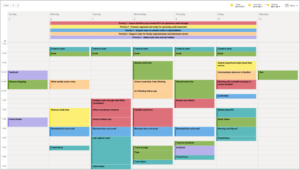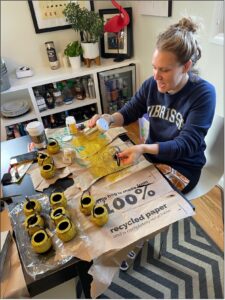Make the Most of Your Week Lesson #5: Faster and Smarter
There are many definitions of efficiency out there, but we like this one best: “accomplishment of or ability to accomplish a job with a minimum expenditure of time and effort.”
Of course, there are many, many parts of our roles in schools that cannot be “efficiencied” or mechanized or routinized or whatever word least offends you because we deal with PEOPLE – vibrant, dynamic, creative, frustrating, unpredictable, rewarding PEOPLE. It is not our goal to change this (thank goodness!), because that would be, well, impossible.
That said, our most limited resource is our time. To lead lives we love, both personal and professional, we have to make choices about where we’ll choose to be efficient and where we won’t. We bet you’ve made some of these choices already and don’t even realize it.
We’ve gathered a few efficiency tips from Together Teachers over the course of the fall and winter that we wanted to share with you. As always, check policies with your organization, school or district before implementing.
Five Faster and Smarter Tips for Teachers
- Stop grading EVERYTHING—or even having the intention to grade everything (I say this as I know I dipped my head in shame one year by putting a whole bunch of old spelling assignments in the recycling bin. . .). Know the questions in advance you want to grade (likely based on your objectives or aims) and just scan the rest. Or do what I did with homework when I was teaching fifth grade (all subjects mind you!): randomly select two students per day for a super detailed homework check, and then only review select problems for all others. Thanks, Nilda!
- No more toggling–Number your students alphabetically, ensure this number is written on each assignment, and ask a student to put the papers in order numerically. You’ll be amazed at how much time this saves when you enter student data. Or you could go one step further like Sue, and have your spouse call out the grades for you!
- Format your assignments for easy viewing. This one may seem very simple, but if you design your homework and classwork so you can simply scan down the boxes on the right-hand side of the page for answers, it saves you from searching all around for student responses. Thanks, Jeff V., for sharing your homework assignments with us!

If you want to download a copy of Jeff V.’s awesome homework assignment, click here.
- Have a lamination mindset. We don’t mean laminate everything. We do mean take a few minutes to carefully label or sort your hard work so you can use it AGAIN. This might mean making time to create clear electronic folders and document names for lesson plans and supporting materials. It might mean taking all those manipulatives for the Thanksgiving math lesson and labeling them in a tub. Trust me. You will thank me next fall.
- Keep a “To Copy” folder nearby. We are fans of making all copies for the entire week all at once. If you haven’t mastered that yet (but you will!), keep a folder on your desk for all items to be copied that you collect during the week. Make sure you have it with you when you leave your classroom — you never know when the copier will be miraculously free and you can sneak in a few copies. Thanks, Jenny C.!
Together Discussion Question: How about you? What have you learned to make more efficient?


